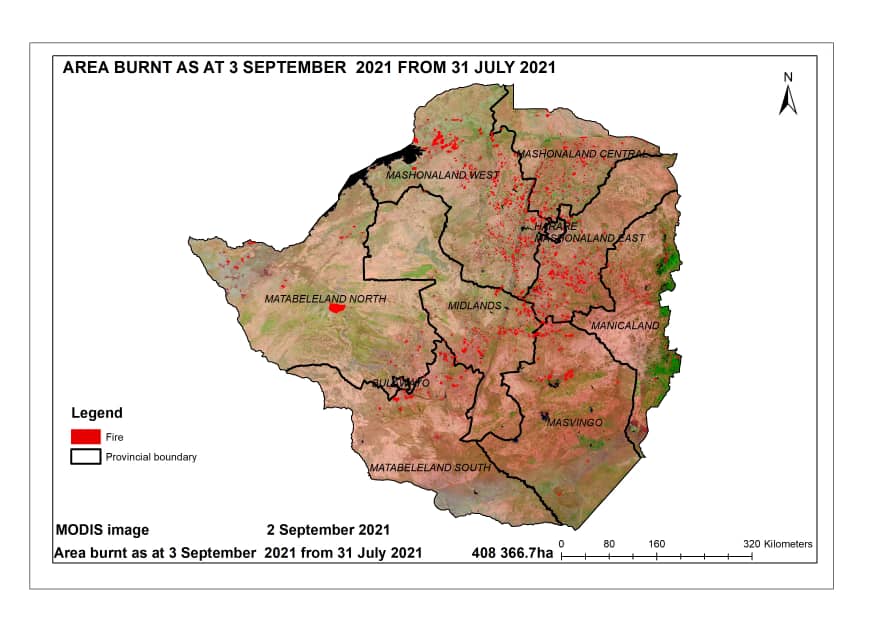|
Getting your Trinity Audio player ready…
|
By Amkela Sidange (Environmental Education and Publicity Manager for EMA)
The country is already in the veld fire season following the onset of the statutory fire season on the 31st of July which will be ending on the 31st of October.
During this period the biomass is dry, it’s windy, and therefore conducive for wild, uncontrolled, and runaway fires which are destructive to the environment, life, property, and agricultural produce.
Since the beginning of the veld fire season, a total of 1 517 fire incidences burning 408 366.7 hectares of land were recorded. The cumulative burnt area translates to 84. 97% increase compared to the same period in 2020 when 220 778.79 hectares were burnt from the recorded 395 veld fire incidences. The veld fires have destroyed agricultural produce, equipment, household property, and plantations worth US$ 187 167.00.

The majority of the veld fires have been recorded in the resettlements 61. 82%, communal lands 7.13%, Forest 7.97%, Safari 7.88 %, Small scale farms 7.05 %, Model A and D 5.56%, National Parks 1.94%, Urban Area 0.26%, Recreational parks 0.12% and other lands 0.26%.
Significant losses have been registered in Mashonaland West, Manicaland, and Mashonaland East. Notably, the causes of the veld fires so far have been identified to be anthropogenic in nature specifically due to, land clearing (28.92%), arson (27.72%), illegal mining (27.72%), poor ash disposal (12.05%), and hunting (3.61%).
To that end, humankind remains its own worst enemy in veld fire management in the country as almost all veld fires recorded so far are due to human activities. Some members of the community are now panicking after realising the intensity of veld fire damages whilst they have no fireguards, and also due to the ongoing prosecution blitz on failure to have standard fire guards by the Agency, thus communities are now frantically making efforts to clear fire guards using fires when conditions are no longer conducive for that method hence resulting in outbreaks of veld fires.
Already this veld fire season fatal loses have been recorded from veld fires caused through this mistimed activity, most notably being the loss of 2 minor siblings aged 3 and 6 and property which included 5 tonnes maize, motorbike, teacher’s cottage and 50 chickens in Hurungwe district, Mashonaland Province.
To date 3 lives have been lost in veld fire-related incidences, including also a female adult aged 59 in Zvimba, again in Mashonaland West Province, which coincidentally remains the hard-hit province by veld fires. During the same period in 2020, only 1 loss of life had been recorded thus translating to a 300% percent increase in lives lost in 2021.
Law enforcement by the Agency remains key in complementing accelerated education and awareness-raising done on veld fire management, resulting in the issuance of 732 tickets, 5 027 veld fire Environmental protection orders, and opening of 43 dockets.
The current trends in veld fire incidences require increased effort by all stakeholders to prevent veld fires, mobilize the local structures to put out the fires, and report the culprits to law enforcement agencies.
For example, community members are not usually keen to give out critical information to law enforcement agencies, such as naming a person who has started a veld fire thus prohibiting the prosecution of offenders and also the protection of our environmental goods and services, property, and life, hence call for communities to assist in law enforcement by providing information as requested by law enforcement agencies. Clarion call is also made to farmers not to attempt clearing fireguards using fires now, as it is windy, dry, and hot thus making it conducive for the start of veld fires.
